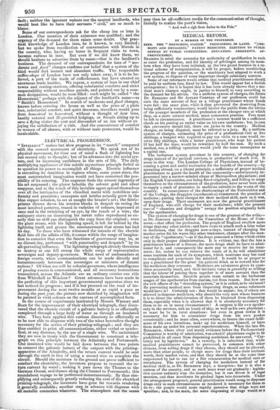ELECTRICAL PROGRESSION.
" INTELLECT " makes but.olow progress in its "march" compared with the onward movement of electricity. We speak not of its physical movement, for time out of mind a flash of lightning has run second only to thought ; but of its advances into the social sys- tem, and its increasing usefulness in the arts of life. The daily multiplying appliances of this subtile mysterious principle forbid us to question its power to accomplish all things. Electric influence is extending its dominion in regions where, some years since, the most outstretched imagination would not have conceived the pos- sibility of its entering. The engraver finds the utmost ingenuity of his art surpassed ; the plater beholds the solvent gold and silver reappear, and at the touch of this invisible agent spread themselves over all the intricacies of the chiselled metal with matchless uni- formity and precision; saucepans and kettles actually grow in the blue copper solution, to set at naught the brazier's art ; the fabric- printer throws down his wooden blocks in despair on seeing the most involved patterns, traced in varieties of colours, impressed at once and in the twinkling of an eye, by the touch of a wire ; the antiquary starts on discerning his rarest relics reproduced so ex- actly that no skill can distinguish the copy from the original; even the giant steam, with his lightning speed, is left far behind by the lightning itself, and groans the announcement that steam has had its day. To those who have witnessed the inroads of the electric fluid into all the affairs of life, it comes within the range of imagina- tion to conceive that even the functions of government may be, at no distant day, performed "with punctuality and despatch" by its all-pervading influence. The lightning-telegraph already threatens to destroy at one fell swoop the whole corps of representative sovereigns and deputy-governors. What need of ambassadors at foreign courts, when communications can be made directly and instantaneously between the sovereigns or ministers of distant nations ? Of what use will be colonial governors, where intelligence of passing events is communicated, and all necessary instructions transmitted, across the Atlantic ere an ordinary courier can ride from Whitehall to Windsor ? Great advances have been made in the perfecting of this important governmental apparatus since we last noticed its progress ; and if it but proceed on the road of im- provement during the next twelve months at as rapid a pace as during the past year, the picture now sketched by imagination will be painted in vivid colours on the canvass of accomplished facts. In the course of experiments instituted by Messrs. WRIGHT and BAIN for the improvement of their electrical telegraph, they disco- vered that the electric circuit of a galvanic battery is as effectually completed through a large body of water as through an insulated wire. They have applied this curious discovery so effectually as to be now able to dispense with two of the wires heretofore thought necessary for the action of their printing-telegraph ; and they are thus enabled to print all communications, either verbal or symbo- lical, at any distance, by the use of a single wire. We understand they are now in treaty with the Government to construct a tele- graph on this principle between the Admiralty and Portsmouth. One insulated wire would be laid down between the two points to connect the galvanic battery of the outport with the printing- apparatus of the Admiralty, and the return current would be sent through the earth in lieu of using a second wire to complete the circuit. Should the moisture in the ground not prove sufficient to conduct the electricity, the inventors propose to transmit the re- turn current by water ; making it pass down the Thames to the German Ocean, and thence along the Channel to Portsmouth; this roundabout voyage to be performed instantaneously. By thus sim- plifying and consequently greatly reducing the cost of the electrical printing-telegraph, the inventors have gone far towards rendering it generally available ; another step in advance will dispense with all metallic connexion whatever. The atmosphere and the ocean
may then be all-sufficient media for the communication of thought, literally to realize the poet's vision, "And waft a sigh from Indus to the Pole."


























 Previous page
Previous page